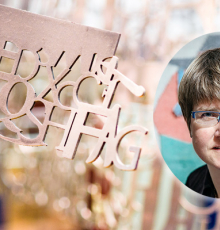Categories
Envisioning Europe: Overseas expansion, Colonial Other(s) and the idea(s) of Europe

Did colonialism play a role in forming a definition of Europe? Join us in a discussion with Professor Markéta Křížová on this fascinating question at the heart of the HEH's narrative.
In this monthly, one-hour, online lecture series, you will get the chance to explore the topical issues, which are a part of the declaration of the Conference on the Future of Europe.
These online sessions include multiple perspectives from various historians and experts, focusing on Europe’s past, and their own insights as to how they connect to the contemporary issues, which Europeans face in their daily lives today.
The moderated discussions will involve its participants in an ongoing conversation - on how to actively engage citizens in democratic processes, and provide concrete recommendations to build a more resilient and responsive Europe.
The concept of ‘Europe’ is difficult to clearly define, as it developed over time and acquired specific meanings at different historical moments. While rarely used prior to the eighteenth century, the term was already accepted as a social and cultural concept by a great proportion of the continent’s inhabitants at a much earlier stage. This lecture will focus on one of the most important catalysts for such an intellectual development; Europe’s overseas expansion, commencing in the fifteenth century and continuing until the beginning of the twentieth.
The dramatic expansion of horizons during the first wave of colonial acquisitions between the 15th and 18th centuries gave rise to a process of self-fashioning an imagined community of ‘Europe’. This developed in parallel to the formation of regional and later national identities during the same period. Such a notion of a distinctive identity was grounded in comparisons with the supposedly ‘barbarian lifestyles’ of subjected people.
The second wave of colonial expansion during the 19th and early 20th century brought Europeans into contact with an ‘expected unknown’. However, the variety of human groups encountered, their allegedly ‘strange’ customs and usages, along with new forms of media consumed by the general public, all contributed to a further elaboration of ideas about cultural and biological distinctiveness.
This lecture aims to explain and discuss some of these processes. Traces of this colonial self-fashioning in current ideas about Europe will also be identified and explored.
Markéta Křížová Biography
Prof. Markéta Křížová, Ph.D. (*1974) is a professor at the Centre for Ibero-American Studies at the Faculty of Arts, Charles University. Since 2018, she has also been the faculty’s Vice-Dean for International Relations and Head of the Centre for African Studies at Charles University.
She received a scholarship to study at the University of Texas in Austin (1995), has held a doctoral fellowship in Mexico (2002), a research fellowship in Germany (Ibero-Amerikanisches Institut in Berlin, 2017), and a visiting professorship (Cátedra Jan de Vos) at the Centro de Investigaciones y Estudios Superiores en Antropología Social/Colegio de la Frontera del Sur, San Cristóbal de Las Casas (Mexico) (2018). Prof. Křížová lectures on native cultures in Latin America, colonial history, the history of cultural transfers, transatlantic relations, and the methods and techniques of historiography. Her academic interests focus on the history of overseas expansion, migration and intellectual history (including the history of museums and racial thought).
Besides other works, she has published, , the following monographs:
La ciudad ideal en el desierto: Proyectos misionales de la Compaňía de Jesús y la Iglesia Morava en la América colonial (2004);
“The strength and sinews of this western world...”: African slavery, American colonies and the effort for reform of European society in the Early Modern Era (2008); Reyes, emprendedores, misioneros: Rivalidad imperial y sincretismo colonial en la Costa de Mosquitia, siglo XIX (2016).








